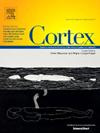The serial order system in word production and working memory: A case series approach
IF 3.2
2区 心理学
Q1 BEHAVIORAL SCIENCES
引用次数: 0
Abstract
Serial order is important in verbal behavior, such as sequencing words in working memory (WM) or arranging phonemes during speech. In both WM and word production, distinct processes are found for item identity and their serial order. In the current study, we investigated whether a shared system supports the serial order of verbal items (phonemes or words) across cognitive functions (WM and production) and tasks (repetition and naming). We recruited 30 participants with chronic stroke-induced aphasia. We examined WM abilities to recall item and serial order information using immediate serial recall tasks of words. We also assessed the ability to accurately sequence phonemes in word repetition and naming tasks, with its impairment indexed by the proportion of misordered phonemes among all incorrect phonemes compared to chance in phonologically related word and nonword responses. We examined how variability of this index of serial order impairment in repetition and naming relates to item and serial order WM capacities. Our findings reveal that serial order WM capacity, but not item WM capacity, was associated with the severity of serial order impairment in repetition, indicating a shared serial order system for WM and repetition. We also found that item WM, but not serial order WM, was associated with serial order impairment in naming, implying an item WM buffer for phonemic sequencing in naming. These results suggest distinct sequencing processes for repetition and naming, each linked to different WM mechanisms. Implications for word production models and the relationship between WM and word production are discussed.
单词生成和工作记忆中的序列顺序系统:病例系列研究法
序列顺序在言语行为中起着重要的作用,如工作记忆中的单词排序或讲话中的音素排列。在WM和word生产中,发现了不同的项目标识及其序列顺序的过程。在当前的研究中,我们调查了一个共享系统是否支持跨认知功能(WM和生产)和任务(重复和命名)的言语项目(音素或单词)的序列顺序。我们招募了30名慢性中风性失语症患者。我们使用即时序列回忆任务来检验WM回忆项目和序列顺序信息的能力。我们还评估了在单词重复和命名任务中准确排列音素的能力,并通过与音系相关的单词和非单词响应中的错误音素比例相比,错误音素在所有错误音素中的比例来索引其损害。我们研究了重复和命名中这个序列顺序损伤指数的可变性与项目和序列顺序WM能力的关系。我们的研究结果表明,序列顺序记忆能力与重复中序列顺序损伤的严重程度相关,而与项目顺序记忆能力无关,这表明序列顺序记忆和重复存在共同的序列顺序系统。我们还发现,条目WM与序列顺序的命名障碍有关,但序列顺序WM与序列顺序障碍无关,这表明条目WM对命名的音位顺序有缓冲作用。这些结果表明,重复和命名的不同测序过程,每个都与不同的WM机制有关。本文讨论了词生成模型的含义以及词生成与词管理之间的关系。
本文章由计算机程序翻译,如有差异,请以英文原文为准。
求助全文
约1分钟内获得全文
求助全文
来源期刊

Cortex
医学-行为科学
CiteScore
7.00
自引率
5.60%
发文量
250
审稿时长
74 days
期刊介绍:
CORTEX is an international journal devoted to the study of cognition and of the relationship between the nervous system and mental processes, particularly as these are reflected in the behaviour of patients with acquired brain lesions, normal volunteers, children with typical and atypical development, and in the activation of brain regions and systems as recorded by functional neuroimaging techniques. It was founded in 1964 by Ennio De Renzi.
 求助内容:
求助内容: 应助结果提醒方式:
应助结果提醒方式:


